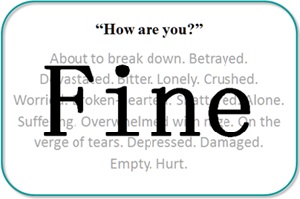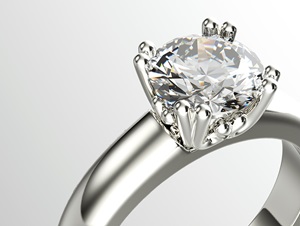Dealing with Emotional Pain after Divorce
Divorce triggers all kinds of emotional pain and unsettling feelings. It totally disrupts the life you knew and launches you into uncharted territory. Everything changes; your routines, your ability to trust another person, the loss of your self-esteem, and uncertainty about the future.
Along with these changes, you may be blown away by how devastated you feel (even if you wanted the divorce). Allowing yourself to feel your emotions and move through the pain of your losses is what can help you let go of your old relationship and move on with your life.
Allow Yourself to Heal
By Linda Aspen-Baxter
Are you feeling immobilized by the pain of the break-up of your marriage? Do feelings of fear and powerlessness bind you to the inner hell you are living? Do you feel like you are standing alone in drifting sand that obliterates the forward path that you know you need to take but cannot see?

And in spite of the devastation and loss you are experiencing, do you feel that you need to show the world that you can power through the debris of your shattered life and survive? If so, you are not alone. I remember that inner paralysis well — going through the motions of each day, wearing a paper-thin veneer of “being okay” to present to the world, while you feel broken inside.
As you begin to navigate this change of direction in your life journey, how do you begin to not only survive, but thrive? You need to allow yourself to begin to heal. That is the only way to begin to ease the pain that catches you with every breath — you need to allow yourself to feel the pain.
Experience the pain as it surfaces
As you feel it, you allow it to be expressed and released. You may need to pick your times when it is safe and appropriate to express your pain, but you do need to express it. Allow it to rise within you and feel it right to its depths. It is scary because it feels like it is going to engulf you, but I promise it won’t. If you go right into it, its power will swell, crest, and subside — and you will find a sense of calm and peace as it does. Do this as often as your pain rises within you. It needs to be acknowledged and released.
In the first weeks and months after I left my marriage, I tried so hard not to succumb to my inner pain. I tried to present a strong outer image — that “I’m a survivor” persona. I couldn’t fall apart because my children needed me… and because I felt that everyone in our small community was watching to see how I did. I believed that I had to be stoic and that I needed to just do what needed to be done. As much as my heart felt broken, I stuffed my pain down and went through the motions of going on with my life.
That approach appeared to work on the surface, but it really didn’t where it mattered most. As much as I needed to be strong for my children, I also needed to allow my pain to rise so that it could be released. I think that part of my avoidance was because I was afraid of it. It turned out that I had nothing to fear. I didn’t lose myself in it. It didn’t swallow me. What I did need to do was to feel it — to allow it to rise and then to go.
Getting past emotional pain requires a grieving process
Experiencing your pain will make you a weepy, sobbing mess, and that is okay. Your emotional pain is real, and the only way to get over your loss is to grieve it. Don’t stuff it down and pretend that you are okay. Find a safe place and way to express your pain — be it through crying, raging, writing in a journal, talking to friends and crying on their shoulders, exercising, punching your pillow — just do it. It will be the best thing you can do to help yourself to heal. Every time that you express your emotional pain, you are releasing it, and over time, you will begin to feel better.
I wish I had known what I am sharing with you now. I soldiered on and tried to do everything I could to help my children heal and to handle the demands of being a single, working parent. I kept pushing myself to do what needed to be done, and as my son manifested his pain in debilitating anxiety attacks, I sought medical help for him. As I talked to my doctor about my son, I was upset and emotional. I cried; of course I did. I was worried about my son. I also admitted to chronic, severe headaches that regularly became migraines.
My doctor’s response to the help I sought for my son was to refer me to a psychiatrist. I went, thinking it was to help my son. It turned out that the appointment was for me, and the psychiatrist’s solution was for me to take a month off work so that I could get onto antidepressants.
When I told her that I couldn’t leave work because I had to support my children, she threatened me with hospitalization and then, who would look after my children? I acquiesced because I didn’t know what else to do; I didn’t know that I had other options. And I began the process of what became a 19 year dependency on Effexor. When I think back to my doctor’s maneuvering to get me to see a psychiatrist, without my knowledge or agreement, and the psychiatrist’s quick and easy solution to my stress and emotional pain, I am outraged.
I know that they cared and meant well, but chemical dependence to a toxic substance was not the answer to what I was experiencing. Of course, I was stressed and emotionally upset. I was a couple of years into my journey of survival — into my journey of pushing on — but I definitely wasn’t thriving. I needed to commit to my own healing process in order to do that.
Experience your emotions so you can release them
I know now that the only way to truly heal is to feel what you are feeling. Of course, you are grieving. You have lost your partner, your relationship, and all your hopes and dreams for your family. You need to take the time to feel what you are feeling, and in time, it will get easier because, bit by bit, you are releasing the pain that you have internalized over a long period of time.
If you have experienced the trauma of abuse or addiction in your relationship, you have even more emotional pain and hurt to process and release. Don’t try to suppress it. If you do, it will lock into the tissues of your body and manifest itself in other ways — as physical illness and pain. It certainly did for me. Emotional pain doesn’t go away by itself. It needs to be acknowledged, expressed, and released for true healing to happen.
When tears come, don’t push them down and pretend to be okay. Tears are your body’s natural healing mechanism. To deny them is to deny what your body innately knows to do to cleanse itself of toxins caused by emotional pain. Allow the tears to flow, get soggy and messy for a while, and then as they ease, get up and get moving.
I have found that moving my body in whatever way feels good also helps me in my healing process. For me, combining body movement with time in nature brings me peace and soothes and uplifts my soul. I try to get out into nature to walk and jog as often as I can. It is a natural pain remedy.
As you experience the pain and shock of your separation and divorce, allow yourself to feel and express it in safe ways. It will be the best thing you can do to heal and to begin to thrive. And you deserve to do far more than survive this pain and loss. You, my dear, deserve to thrive!
One more thing… and for me, it has been crucial on my journey of healing… know that you can turn to God to help you heal. Give up your pain to the Holy Spirit and allow His wisdom to guide you and God’s Love to soothe you. If you wish to know more about my journey I invite you to visit my Linkedin page. I would love to hear from you and to connect with you! You can do this! I believe in you! With great love, Linda
Divorce is one of the most painful experiences a person can go through. But remember, no matter how strong your grief, it won’t last forever. These articles can help you start to heal your emotional pain:
How to Deal with the Pain of Divorce
Quick Tip for Coping with Divorce Stress

